#music criticism
Text
Ok, so I've been seeing some discourse around Odysseus and Eurylochus about who is the bad guy.
Odysseus is the bad guy because he gave his name, rank, and serial number to the Cyclops.
Eurylochus is the bad guy because he opened the wind bag.
Odysseus is the bad guy because he sacrificed 6 men.
Eurylochus is the bad guy because he killed the cow.
And I think a lot of you are missing the point.
Is Odysseus giving his name to the Cyclops, not knowing that would bring down the wrath of Poseidon, any worse then Eurylochus opening the wind bag, not knowing it would take them to Poseidon or vice versa? They didn't know it would end badly. They were both warned by someone they trusted that it would end badly if they took that course of action and they did it anyway.
Is Odysseus knowingly sacrificing 6 men to Scylla any worse than Eurylochus knowingly killing the sun god's cow? They both knew it would end in death. The only difference between these two actions is that Odysseus was trying to survive and Eurylochus couldn't live any longer.
Is Odysseus telling Eurylochus to light the 6 torches really any worse then Eurylochus telling Odysseus that he must carry all the blame or vice versa?
Neither of them are the bad guy. And if one of them is, then they both are. Then everyone, Circe, the Cyclops, Poseidon, everyone, is the bad guy too.
This is not a black and white story. There is no good guy, there is no bad guy, there is no clear answer. All it is is protagonists and antagonists and people pitted against each other in the desperate attempt to survive. Those stories are sad and not common in our current culture but this is one of them. Most of life isn't a black and white story and being able to understand that, both in fiction and reality, is important for every relationship, moral, and ideal you will ever have.
#epic the musical#epic the thunder saga#character analysis#odysseus#eurylochus#the only bad guy is Zeus because of how badly he trys to fuck that metaphor#like he loses the metaphor just a little with how much he tries to have sex with it#bad guy zeus#music analysis#music criticism#because this probably doesn't count as literary analysis
72 notes
·
View notes
Text
LADY GAGA AND BRUNO MARS - "DIE WITH A SMILE"
youtube
14 years after "Grenade," Bruno finally found someone who would do the same...
[5.70]
Kayla Beardslee: Hey, when is that Lady Gaga and Bruno Mars collab being released?
[5]
Ian Mathers: Mars and Gaga are both skilled at their craft in a way that often seems like a throwback to an earlier era of the art/industry, taking the biggest swings possible in terms of seeking mass appeal without feeling like they're compromising or calculated, talented mimics and style chameleons when they want to be. Working together on a big, heartfelt, suitable-for-all-occasions ballad actually feels perfect along those lines. The result is the kind of sturdily good (or "good," depending on your sensibilities) song that, if it catches you at the right moment in your life, might make you bust out crying.
[7]
Joshua Lu: This collaboration would've been unthinkable in 2010; now that their careers have somehow converged, the outcome feels weirdly predictable. The emotional heft, vocal runs, and vague nostalgia are there, even if all it does is fill that "Perfect Duet"-sized hole in pop radio. "Die With a Smile" can't help but feel underwhelming in the context of their career trajectories — the kind of corny balladry that Bruno's outgrown and that Gaga mostly uses just to recapture the general public — but it's impossible to wholly reject when it's this nicely crafted.
[6]
Grace Robins-Somerville: Most Obamacore song of 2024, hands down. "Die with a Smile" is this very specific meld of the era when you couldn't go to the supermarket without hearing a Bruno Mars ballad and when Gaga was doing a country pivot (although this is far blander than anything on Joanne). It's been a while since I've heard such blatant Grammy bait.
[3]
Jackie Powell: Entertainment Weekly's Joey Nolfi wrote that “Die with a Smile” is a song that recalls “the emotional bravado” of “Shallow,” the Grammy- and Oscar-winning smash from Lady Gaga’s A Star Is Born. He’s correct. “Die With a Smile” thrives upon accented and intentional dynamics while making vague and simple lyrics mean more than it they do on the page. That’s also what made “Shallow” so convincing. The difference on “Die With A Smile” is that Bruno Mars is more Lady Gaga’s equal than Bradley Cooper ever was. Mars has more to sing on a song that has Gaga’s name billed first, but both artists shine without the other having to sacrifice. Gaga’s part, which begins at around a minute and a half until the song's end, transforms this from a Silk Sonic B-side into something that’s much more memorable, emotionally resonant and cinematic. It's a song that makes me wish I had someone to sing it to.
[9]
Katherine St. Asaph: So old-fashioned that YouTube's preroll ad recommended me Botox, and so definitively a Bruno Mars song that I'm genuinely unsure why the credits are in the order they're in. It works, albeit in an unexciting way, because Bruno and Gaga have practiced melodrama for years -- see "I'd take a bullet straight to my brain" and "not even the Gods above can separate the two of us," respectively -- and have also practiced singing pretty then belting big.
[7]
Jeffrey Brister: When it comes to Bruno Mars, I want immaculately executed genre pastiche, something that sounds like the past but keeps a thrilling modern affect. Gaga, for all of her artsy subversion and slight avant-garde leanings, has just as much of a traditionalist impulse, if not stronger; under the right circumstances, the results can be explosive. That alchemy is present here: two artists synced up and bringing out the best in each other’s performances. There is absolutely nothing new here, but it’s polished and perfectly executed. I’m a mark for that sort of thing.
[7]
Jonathan Bradley: It's not right to say Bruno Mars is so adept with pastiche that he transcends it; pastiche is his artform, his milieu, the genre that this genre artist seeks to perfect. "Die With a Smile" has two ideas: the first being the familiar terrain of the Bruno Mars ballad, and the second being "What if a Bruno Mars ballad was Jeff Buckley?" Even a few years after the 1994 release of Grace, pop music seemed like it only had room in its past for an artist like Buckley: a soulful and beautiful singer-songwriter who leaned toward rock-god charisma rather than folkish introspection. Mars has Buckley's swooning fragility as well as his stormy squalls of guitar, but for all that Buckley represented the last of something, he never sounded like he was going over someone else's territory. That fundamentally does not work for Mars's attempt to recreate the sound; navigating someone else's territory is Mars's entire point. If "Die With a Smile" has a third idea, it's the addition of Lady Gaga, who is herself no stranger to pastiche (see the Madonna-isms of "Born This Way," the heartland rock of "You and I," or the way she slipped effortlessly into the Hollywood prestige turn that was "Shallow"). Here, she delivers only competence, as if she'd been asked to sing backup on a new recording of "When I Was Your Man" and found out at the last moment that the assignment had changed.
[5]
Harlan Talib Ockey: Once you get past the surprise of "Die With a Smile" being a Jeff Buckley impression, it's remarkably insubstantial. "If the world was ending I'd wanna be next to you" sounds clunky and hyper-literal next to, say, "I'd catch a grenade for you". At least the harmonies are nice.
[4]
Iain Mew: Bruno Mars's progression makes it a fruitful idea to go back and invert "Grenade" from a distance. Back then, he took the prospect of death as an opportunity to bitterly prove his unmatched love. Now he meets no less than the end of the world with smooth certainty that it's a chance for mutual togetherness. Lady Gaga's way with projecting intensity and sincerity in the most extreme contexts makes her the perfect foil, and for two lines after she comes in, it's transcendent. Then Mars comes back in, and not only is there not enough space for Gaga to shine, there's barely any space at all. Maybe the old anxiety hadn't gone away completely after all.
[7]
Alfred Soto: Bruno Mars hasn't sounded this convincing a love man in years, if ever. Too convincing: Gaga is a backup singer on her own single. Mars sure would fuck himself if he could.
[5]
Wayne Weizhen Zhang: Someone pointed out recently how absurd it is that Lady Gaga's Twitter bio is literally advertising for the HBO Chromatica Ball special, Haus Labs cosmetics, Joker: Folie à Deux, and now "Die with a Smile." That sums up my feelings toward this entry into the Gaga canon: random and indicating a certain directionlessness—or perhaps overdirection?—in her career. She sounds great, and the bridge is perfect TikTok fodder, but she and Bruno Mars sound like they have as much sexual chemistry as brother and sister.
[4]
TA Inskeep: Mars and Gaga sound nice enough together, but there’s no frisson, no spark; they’re just two famous singers, singing a duet for you to stream and buy.
[5]
Scott Mildenhall: To the song's great benefit, the annihilatory proposition is underblown. Instead, its precise lilt is folded and finessed throughout, heading hither and thither without over-accelerating or escalating. It's a fine balance between ostentation and undulation. There's minimal vocal chemistry, but the blend is happening elsewhere.
[7]
Hannah Jocelyn: I was with family over the weekend, and my brother asked “who is this??” like it was two stunning new artists on their debut single. Upon learning it was Lady Gaga and Bruno Mars, his excitement dissipated. Only Andrew Watt could make two of pop’s best vocalists sound anonymous (don’t get me started on that weightless drum sound he's inexplicably made his signature). I can’t tell where Gaga ends and Bruno begins, which is a horrible mental image.
[5]
Taylor Alatorre: The drums treat every other measure like it's a climax because the entire song, or more precisely its billing, is one undifferentiated climax. Which means no build-up, no peaks or valleys, no memorable grooves or meaningful sense of release. It's just those two names together on a lighted marquee, a chart-watcher fanfic straight out of 2012, What Could Be measuring short against What Must Be, which in this case is the greatest common denominator of softer-than-talcum piano balladry. At least "Grenade" had cartoon bloodletting on its side, and "Shallow" had the benefit of context. "Die with a Smile" reaches for that old doomsday rhetoric out of sheer reflex, even when the prophesized end is painted in washed-out watercolors, like a dream whose outlines dissipate five seconds after waking. Andrew Watt's approach to retromania is less playful than the Smeezingtons' was, but also strangely less reverent, since if you truly revere the music of the past then you don't try to half-seriously Mandela effect yourself into its hit parade.
[2]
Nortey Dowuona: Bruno Mars and Lady Gaga getting to coast by cornering the market on having both vocal talent and a modicum of charisma -- you know, the old-fashioned model -- would be frustrating, but at least Watt's patient hand is keeping this over there next to the white Broadway crowd. Anything but more Bruno funk.
[7]
Mark Sinker: Obviously I want to claim I’m only onboard with Bruno as a project at last thanks to Gaga’s in-video cigarette — casually centred, disgustingly compelling — but I have to admit it’s something entirely more wholesome: the actual topic, the actual melody, the actual delivery! He got me in the end! (Also, I like thinking of him as a little monster. He is a little monster….)
[8]
Jacob Sujin Kuppermann: Would be a [6] with flipped Mars-Gaga ratio, but even then this would not quite get to the force of melodrama that would allow it to reach exit velocity and escape the great and depressing middle ground of tasteful 20th-century pop pastiche. These two have taken enough stabs at staid, boring pop songs for all occasions that they have become the legacy acts they once aspired toward and collaborated with. Good for them; bad for us.
[4]
Kristen S. Hé: As much as I wish this Venn diagram had produced something more adventurous, it's arguably harder to write a song like this -- one that'll probably be on radio rotation for decades, and that I'll never object to hearing in any context. I've often found Bruno's schtick cloying and insincere, but here, I'd believe it even without Gaga's added star power. Bruno, please stay in this lane forever. (Gaga, please don't!)
[7]
[Read, comment and vote on The Singles Jukebox]
#lady gaga#bruno mars#music#pop#music writing#pop music#music reviews#music criticism#the singles jukebox#Youtube
42 notes
·
View notes
Text


LITERARY DIGEST, March 26, 1927

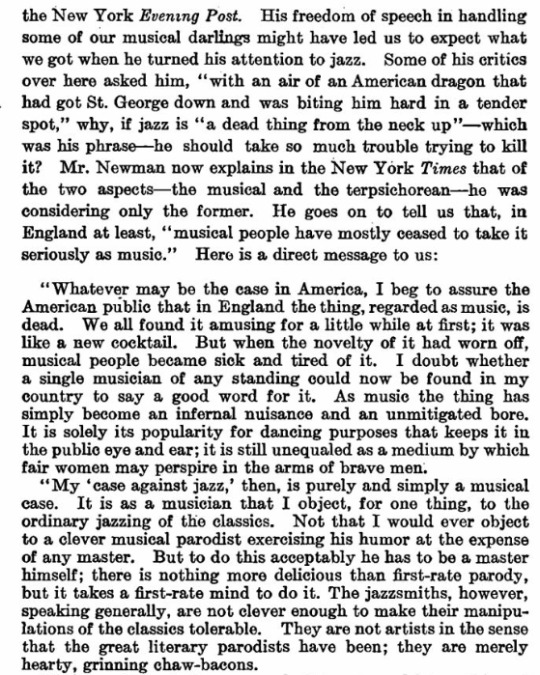

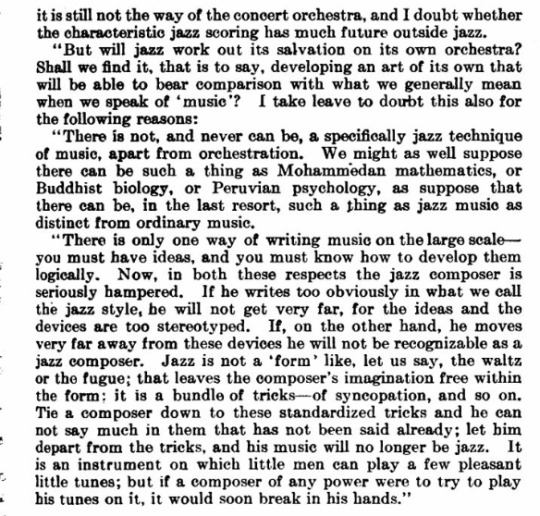
What did Duke Ellington have to say about this? You won't find out here....
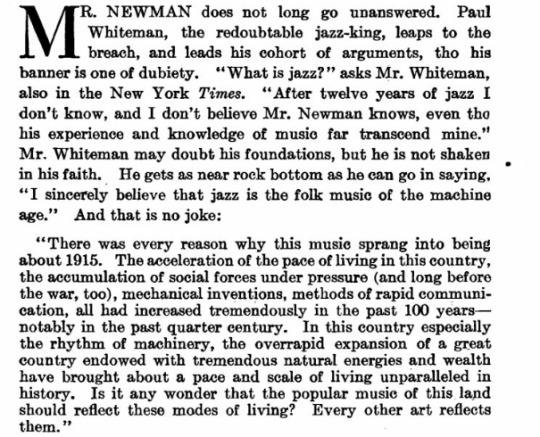

#1920s#jazz#music criticism#music snobbery#elitist philistinism#ernest newman#paul whiteman#miguel covarrubias
42 notes
·
View notes
Text
diving into Phil Ochs tumblr reminds me of Chris Estey’s essay on Phil Och’s Greatest Hits album (which as everyone knows was not a greatest hits as Phil Ochs didn’t have any hits). it’s from a 2009 zine and the 2010 Best American Music Writing, which is where i came across it. Did a quick & imperfect scan on my phone, you can get it here.
uh, it talks a lot about suicide and death and other unpleasant things. think it’s great though. one of those things i read — almost fifteen years ago now — that made me realise what this kind of writing could really DO.
here are a couple of shorter bits
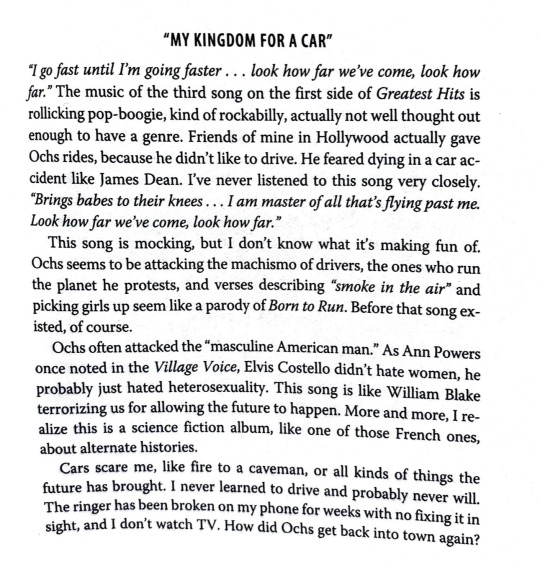

41 notes
·
View notes
Text
me: "oh yeah I like some of taylor swift's music! :)"
yall: "OMG YOURE SO STUPID AND ACTUALLY YOU DONT UNDERSTAND ART YOURE SO EMBARRASSING YOU LISTEN TO BAD MUSIC! CRINGE! BASIC! ALL OF HER MUSIC IS BAD AND I WOULD KNOW!!!! I HAVE THE POWER TO DECIDE WHAT ART IS OBJECTIVELY GOOD AND WHAT I SAY GOES!!! DONT YOU KNOW YOUR VALUE AND WORTH IS ONLY MEASURED BY HOW COOL AND UNIQUE YOU ARE WHICH YOU ARENT BUT I AM SOOOOOO COOL AND UNIQUE YOURE THE PROBLEM NOT ME!!!!!!!!"
#like woah my guy sorry i had fun#and before yall start this isnt talking about genuine critique or people discussing her actions and selective political activism#be fr you know the people im talking about#im also not here to defend all swifties actions or words#im just a casual fan stanind in front of the internet begging to have nuanced conversations again#taylor swift#taylornation#ttpd#ts ttpd#the tortured poets department#ts11#swifties#music#new music#music criticism#internet etiquette
22 notes
·
View notes
Text
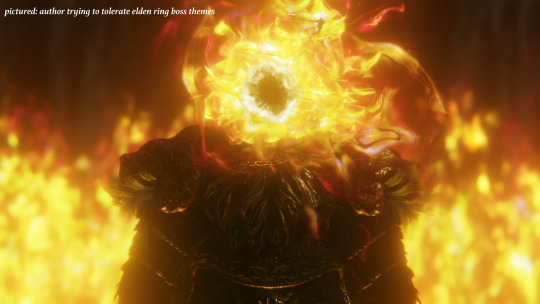
Hey! I have another new piece available to read on my Substack page:
PREPARE 2 SIGH: The Music of Dark Souls, etc.
A version of this piece was originally on my blog here, years ago, but -- I genuinely can't remember doing this, or why I would've done it -- it looks like I deleted it. I'd been wanting to write about the Dark Souls series' and Elden Ring's soundtracks after being disappointed (once a-fucking-gain) by the latter's music, so I recovered the lost article via Wayback Machine and have greatly edited and added to it.
As with the piece on Xenogears' soundtrack, I suppose I've taken a position against a majority opinion, but then that's the way of things usually with myself, it seems. Very good!
#dark souls#elden ring#soulsborne#fromsoftware#videogame music#soundtrack#vgm#videogame criticism#music criticism
21 notes
·
View notes
Text
This is why the elder is the best kiss album.
The “elder” not only brought us a progressive plot line, but details in every sentence and breath that have not yet seen the glory they’re due for. Let’s take a deep dive real’ quick and discuss why the elder is better than Animalize, Creatures of the night and Destroyer.
I. Doesn’t that just stick out to you like a sore thumb? What a wonderful and inspired title to catch our attention immediately. Then we have “the oath”, which has some of the most intense lyrics I’ve ever heard.
“Your glory, I swear I ride for thee
Your power, I trust it rides with me
Your servant, I am and ever shall I be”

The power in these lyrics changed my life, as well as the intense moral dilemma we’re faced with. My heart raced. The performance of this song was absolutely superb, so much so I fell out of my chair.
Gene and Paul’s faces while performing this song are packed to the brim with emotion. Eric looks down the whole time thinking of the fallen heroes from the story while Ace finishes with his back turned.
You can see the effort that was put into this album. Gene’s opera voice adds a layer to this song that puts the chipmunks to shame. Maybe, if the chipmunks had covered the album, it would’ve went platinum.
The elder was not career suicide.
“Lost in the mist
I have been there a hundred times or more
Pounding my fists”
The lyrics made my head spin with emotion, making me feel like I was lost in the mist, pounding my fists. I could feel the tears in my eyes listening to this. It’s so powerful.
It’s like the roar of a t-Rex or the ropes of the net. I’m sure many dinosaurs and hell, protozoans, even, could relate to these beautiful, awe inspiring lyrics. They had to face these complex inner issues.
The rest of Kiss’ songs are just ‘sex money feelings die’ while this opens a window to a historical period, purely composed of survival, that we have never yet seen in this sort of light.
These lyrics really open the perspective on what it was like for cave men to survive. The fight for them must’ve been more than anyone could’ve imagined. They too, were in the mist. But this also develops the narrative for animals like wolves.
Now we know the wolves’ thoughts when they howl to the moon, solely composed of the elder. Ages of evolution have been unwrapped, bringing us back to the Big Bang itself.
This was such an experience for me I developed lycanthropy. This is confirmation of what we all may have known. The dinosaurs are not ever portrayed scientifically accurate and it irks me every time.
Like a lot of them most likely had feathers as T-Rex’s sounded like microwaves no roaring. I was very surprised to find this out. There was a period when dinosaurs rules the planet then mammals that ruled over humans.
Not only that, but “I”? That’s all the caveman thought about when trying to make the world their own.
We as a species rose up. We as a species hunted and foraged to build the society we live in today. So why don’t we all just go back to leopard skins and spears like the elder intended? Does this mean Kiss are all secret geniuses?
Bravo, Vince. You did it again.
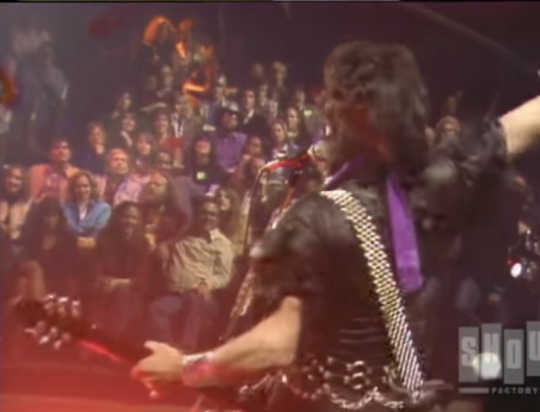
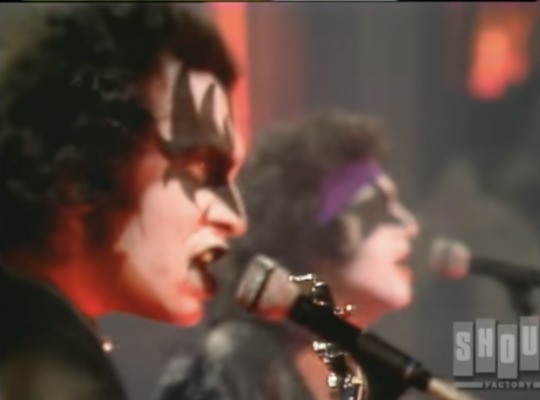
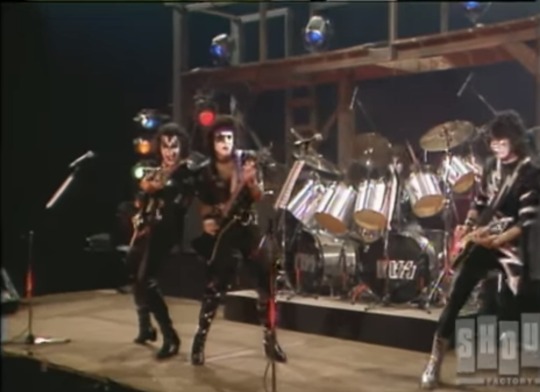
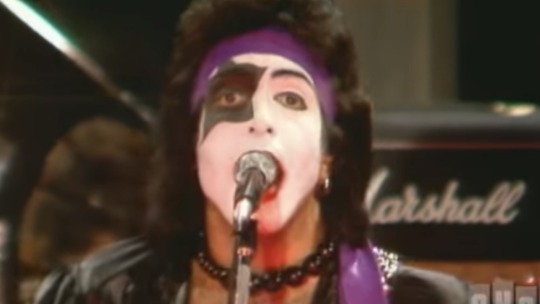
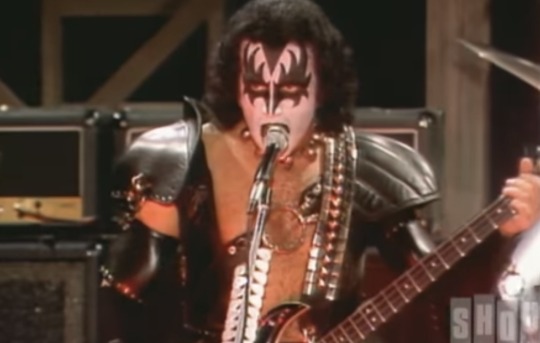
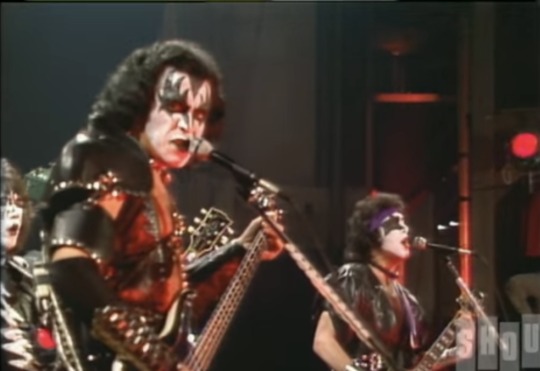
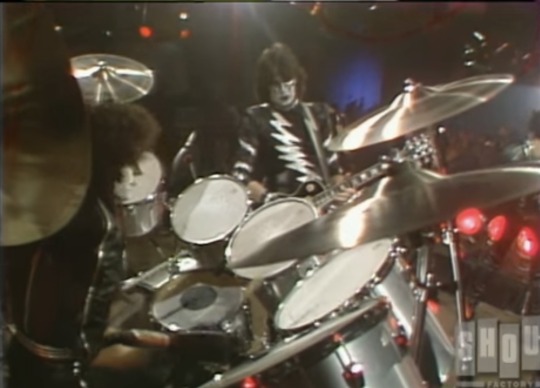
#the elder#kiss band#80s rock#80s music#music criticism#unpopular opinion#kissblr#good take#shitpost#ngl when I first watched the oath being performed#I fell out of my chair sobbing because it was so bad
14 notes
·
View notes
Text
Let’s talk about the first verse, a perfect little poem. I find its vagueness so compelling - the words meaning a lot without saying anything specific. There is an outline of a plot. Murky details with just enough definition to entice you to figure it out. I’ve spent too much time the past week trying to unspool the story thread, with its gestures towards death, infidelity and suppressed trauma. And Thug’s delivery of it is full of drama. His voice just above a whisper, he takes cinematic pauses before a high pitched resolution that sounds definitive but isn’t: the last line is a throwaway “for what it’s worth”.
It beautifully sets up the chorus. Reading it’s title and lyrics, you might expect “Never Made Love” to be the kind of chauvinistic song about disposable sex often thrown around in Hip Hop. But it’s not. Instead, Thug croons with pain rather than braggadocio; with a sorrowful knowledge that he can’t open himself up emotionally to truly make love. He repeats those three words over and over, extracting everything out of them before Rich Homie Quan joins in. I love their interplay, the way Quan goes high when Thug goes low. They play off each other, only needing three words to create a pathos inducing chorus that runs for half a minute. It’s spectacular stuff. Would the world be a utopia if Rich Gang never broke up? Maybe not, but when you listen to a collab like this, it’s hard not to dream.
10 notes
·
View notes
Text
lyric critique~
the tortured poets department uses a lot of religious buzzwords. this is not the same as making a religious metaphor.
ex.
verses from guilty as sin
“i choose you and me, religiously.”
“without ever touching his skin, how can i be guilty as sin?”
vs mitski’s i’m your man
your an angel, im a dog
or you’re a dog and i’m your man
you believe me like a god
i destroy you like i am
you see the difference?
quoting genius’s annotations-
“this heightened status immediately highlights how intense and profound their connection was, with the other person being so trusting of her it is comparable to a religion.
this recontextualises the first line of the song; the subject is angelic because they were pure in their devotion, and mitski, now, considers herself a “dog” for not having valued that.”
also taylor has used the phrase “guilty as sin” in another song before (carolina). so it kinda seems lazy. you run out of phrases?
13 notes
·
View notes
Text
I keep seeing music journalists and critics referring to Eleanor Rigby as a pop song??
Maybe it’s just me but I’ve never heard it that way
#the penultimate popsong apparently#like I get it has big energy and goes off but that doesn’t mean it’s necessarily ‘pop’#I dunno maybe I’m wrong#music criticism#eleanor rigby#paul mccartney#the beatles
6 notes
·
View notes
Text
My thoughts on Fuck The World by Sematary, Hackle, and Sosa
Haunted Mound's music and the discourse surrounding it exemplifies the fact that you can't truly "win" in the music scene as a whole, you will have haters don't matter what (unless you are a blonde woman who sings folky pop music and people treat you like a god and the ones who dare to dislike you are called misogynists or even nazis).
Sematary is widely known for his quick uprising to underground hip hop hegemony being compared to groups like Drain Gang, Goth Money, and G59, the thing about his music is how the direction he started his music attracted a particular audience who were at most interested in the witch house + emo + plugg fusion he did with his partner Ghost Mountain, but as time passed, Grave Man changed his style to noisier and drill oriented, talking about violence and murder on a more Horrorcore fashion instead of the peep-esque emo misanthropy of his debut albums. The noisier style is often fused with black metal music.
The issue here is how the paradox of innovation applies to his art, you see if he kept the style he had with Ghost Mountain to this day, people would call him repetitive and one-note. If he kept the black metal style of the Rainbow Bridge saga, he would be called one note and repetitive. And because he is keeping the violent dissonant witch drill style, he is being called repetitive and one-note. But there is also the fact that every time he innovates his style to a new direction, he alienates a part of his audience, as he alienated people who wanted more black metal-style music, and he alienated the Ghost Mountain fan audience who wanted more emo witch plugg. That's why I say that he is stuck on a paradox where he can't truly win everybody and by scrapping KOTG 2 because of its poor reception, he is playing by this game that he can't win, since he has constantly shown how much he cares about the opinions of others, he doesn't "do what he wants to do" as he claims to, if he did, he wouldn't scrap songs based on other's people reception.
Now, about the song, it's truly overhated by the Haunted Mound fanbase. Yes, Sematary's lyrics are freestyled and this makes them incredibly cheesy, but the cheese of lyricism is what gives Horrorcore music its particular charm, we are talking about a genre where one of its pioneers had lyrics about having sex with pigeons. Hackle and Sosa's verses are more gangsta-oriented and don't look freestyled at all, which gives the song a notorious quality jump from there. with Keef's verse being the best of all and giving me personally an adrenaline jump unique to him, I would mosh to his verse despite hating crowded environments.
#stoneflower's pseudo journaling#stoneflower writing#haunted mound#music criticism#music#sematary#hackle#chief keef#glo gang#ftp#horrorcore#horrorcore rap#hip hop#underground hip hop
13 notes
·
View notes
Text
The grammatical metaphor of music is popular in compositional instruction, and it likely has some utility, however, I believe that it is more limiting then helpful.
choral music can be a good example of this, so here is an excerpt from carol of the bells (with the original Ukrainian lyrics)

the contrast between the melodic movement and the lyric movement should be obvious.
this entire piece is constructed around that single bar repeated lic, which repeats, exactly the same, for 42 of 54 bars. in those remaining 12 bars the lic is passed to a less prominent register, but It's still there.
(Note also; this lic doesn't resolve, in the grammatical metaphor it isn't a full sentence, it's a fragment.)
it would be nonsensical to write a poem with a structure this repetitive, and we can see that in the lyrics, which contain much less repetition.
However, it is this repetition that makes the piece work, it ties sections together and gives the music a clear and catchy structure.
Fundamentally, speech is a symbolic medium, but melody is abstract. So I, personally, have never seen why there should be any conceptual overlap between the two.
#music theory#music#musicians on tumblr#carol of the bells#choir#classical music#composition#music criticism
16 notes
·
View notes
Text
CHARLI XCX FT. LORDE - "THE GIRL, SO CONFUSING VERSION"
youtube
We opened July by giving you a Charli remix; we now close July by giving you a Charli remix. Let's work it out in the blurbs, then see you next month!
[7.62]
Julian Axelrod: The girls are fighting. The girls have always been fighting. Sometimes with each other, sometimes with their labels, usually with themselves. But even in a year dominated by petty beef, the girls are rarely fighting on record. Leave it to Charli to realize pop music is all wrestling and execute a perfect reverse heel turn. The week BRAT dropped, pulling back the coke-stained rug to reveal a trap door of professional insecurity, fans and critics clung to "Girl, so confusing" as the last vestige of the carefree club romp we were promised, spawning a million think pieces about which curly-haired brunette started the beef. Bringing Lorde into the mix one week later was at once an escalation and denouement, negating the feud narrative and digging down to the real emotions buried beneath its glossy sheen. Charli resents Lorde's success, her flakiness, and her critical acclaim. Lorde sees Charli as a 365 party girl too cool to acknowledge her, let alone invite her to collab. It's all so insular and meta and self-obsessed and earnest and honest and real, to the point where it's almost too intimate to witness. But it's a testament to Charli and Lorde that the whole thing doesn't topple under its own weight, and hearing them write to each other's style makes you realize they have more in common than just hair. The girls are talking. The girls are collaborating. The girls are working it out on the remix.
[9]
Jacob Sujin Kuppermann: Iconic! Culture-changing! This could have been a podcast!
[5]
Andrew Karpan: Upon release, it was funny to hear the speculation that this record was about Lorde, in that way that it is always funny to know something that feels intimate and real about a roving symbol of pop phenomenology. At any rate, it was satisfying to hear that we were right. Turning this from subtext to text feels like a decisively modern gesture, a living and breathing genius dot com annotation, something one could easily confuse for Taylor Swift’s 1989 rollout or any other kind of “this phony fake friends fake girl power shit” -- but I’m less inclined to be cynical, even in the meme economy of it all. The fiction of these two people with their relatable problems is played so straight that I practically cried at the end. She rides for Charli! Charli rides for her! Hang it in the Louvre, but down in the back.
[8]
TA Inskeep: I've traditionally not been a fan of Charli XCX, for various reasons not worth getting into here. That's relevant because I am thoroughly knocked the fuck out by the next-level-meta "girl talk" dialogue of this meeting-of-the-minds remix. Lorde responds to Charli's verse with a lacerating one of her own, spilling her guts and getting very real; talk about "work[ing] it out on the remix," goddamn. Charli, of course, is expert at riding producer A.G. Cook's hyperpop rhythms, but to hear Lorde matching her as the track heaves and bumps is a shock. This is profoundly soul-baring pop, what with Lorde candidly talking about eating disorders and Charli admitting on her opening verse "I don't know if you like me / Sometimes I think you might hate me." That they're doing this so publicly is frankly stunning. This feels like -- this is -- a true pop moment.
[10]
Alfred Soto: They're having fun, and for once one of these interrogations sounds lived-in. The beats pop harder. Listening to Lorde and Charli ribbit around the cheerful electro-frogs is a visceral pleasure. Few of the problems they describe code as "girl," though, so I'll be the spoilsport.
[7]
Katherine St. Asaph: The original "Girl" had three problems, none of which got worked out on the remix. Problem the first: As with hot girl walks and girl math, this stuff is not especially girl-coded. Social anxiety and fake friendships are the human condition! Problem the second: I know it's a fandom joke, so apologies for bringing reality into your memes, but it must be said that basically no one is out here seriously comparing Charli XCX to Lorde, at least that I recall. I did a quick search to prove that I hadn't gaslit myself for a decade, and all I could find was this interview; which was almost definitely a bit; this anecdote about a taxi driver, which is mostly telling about the tastes of taxi drivers; and this Vox piece, which is... not good (or if you want to be charitable, maybe also a bit). In a music world where half the girls are regularly compared to half the other girls, that's an honestly impressive display of how much something hasn't happened. I know that none of us are privy to the actual lived history of Charli and Lorde's friendship, and I can certainly admire Charli stoking a grudge for 10+ years. But the emotional stakes just don't feel as dramatic as they've been hyped to, and thus the Internet inside my heart remains unbroken. Problem the third: There's also a song beneath the parasocial moment-making, and it sounds like "Take My Hand" but not as fun.
[6]
Will Adams: Will I be sent to the gallows if I admit that this pairing had about the same emotional impact on me as when Taylor and Katy reunited in the "You Need To Calm Down" video?
[6]
Hannah Jocelyn: I got thrown into the fire when it comes to female friendship, and honestly I still don't get it. There are entire movies about how nobody gets it, men just assuming women disappear into each other without a man to anchor them. I feel like cis women have the same bafflement, and they've been women for longer than I have. The questions are the same: do you like me? What do you need from me? Do you desire my company? What can I be, and what do I look like from this particular angle? Am I the one you tell your fears to? Do we have the same hair? Do you want to be me? I don’t think it’s a coincidence that this is in the tracklist right after the SOPHIE tribute of “So I”; it’s the same push-pull dynamic, the fascination and the fear of getting too close. Lorde’s devastating verse reveals the insecurities underpinning her decade of coolness, but she manages to add another quotable to her pantheon at the same time: “let’s work it out on the remix” is as sweet as “you buy me orange juice” and “down the back, but who cares, it’s the Louvre." I don’t care much about the rivalry (if there really is one) and don't need to, and that lack of care for extraneous knowledge is why I don’t quite love Brat like the rest of the internet. The juxtaposition between electroclash and Real Feelings occasionally feels like a gimmick, but the best songs make the melancholic subtext into text. This one, with its flanged chorus and cyclical chord progression, gets across the angst underneath the blurry JPEGs and silly memes.
[8]
Taylor Alatorre: It's unfortunate that the zero-sum economy of the pop remix led to the excising of the song's most crucial lyric: "Think you should come to my party / And put your hands up." Apart from its now-obsolete function as a barely veiled clue, it encapsulates the nervous mixture of resentment and admiration that bleeds through both versions and that is so hard to portray sympathetically, let alone with such an impish wink. Charli, as someone who attended more warehouse raves than I did in the early 2010s, had more of a reason to puzzle over that particular line from "Team," to shake her head and wonder whether this post-twee moralizing was really what the kids were into – "the kids," of course, being those three to four years younger than her. Like, it just seems so childish to be genuinely bothered by the chorus to a Flo Rida hit, doesn't it? And yet Charli XCX still goes by the MSN screen name she had when she was 14. The "girl" in the title is as much an age signifier as it is about gender, and the humanizing awkwardness of the remix is a product of its function as an intermural high school reunion, the kind of event that's "confusing" by necessity even if it goes well, which this one does. Your Pop Class of 2013, 'til infinity.
[7]
Jonathan Bradley: In 2011, an eternity ago, Drake offered Kendrick Lamar an entire track on his Take Care album, giving the then up-and-coming Lamar space to talk over his worries about fame and the professional anxieties he felt regarding his more successful host. "React like an infant whenever you're mentioned," Lamar recalled of the Canadian. "He said that he was the same age as myself, and it didn't help cause it made me even more rude and impatient." Having worked it all out on the remix, surely no trouble between the two would ever rise again. So confusing! In 2024, Lorde and Charli XCX connect to puzzle out some feelings, and it works better as an event than a single. Lorde is a savvier writer than Charli and works away at old wounds and insecurities with a sense of intimacy that only appears artless. Unfortunately, the production runs her through filters and bleeps that mold her presence into simply another type of Charli, dispelling the tension created by bringing these two women together. Blame it on Ms. XCX.
[5]
Jackie Powell: The beauty of this remix is how it shines a light on how women in pop in 2024 deal with "diss tracks" -- although, to be honest, the remix makes me question whether "Girl, so confusing" really was one in the first place. Diss tracks often don't reveal complex emotions but just function in a universe filled with envy and pettiness, but this remix reveals the chaos that resulted from poor communication, fear, body issues, anxiety and depression. Both Charli and Lorde admit that the confusion of being a girl is a result of comparing your insides to someone else's outsides, a mental exercise that's often destructive but difficult to stop. "It's you and me on the coin/The industry loves to spend" is their acknowledgment of what came across as transparent and icky on Kendrick Lamar's "Not Like Us." Also, Lorde sounds the most compelling she has since 2017's "Melodrama"; while I always prefer less Auto-Tune than more, her talk-singing with audio distortion behind her vocals reminds me why she was so beloved. Her messaging is focused: Lorde at her best. Her vocals are dark: also Lorde at her best. What I find most fascinating here is the choice of words during the final pre-chorus. Charli and Lorde sing that they "ride for each other" after working this out, which sounds more sincere than singing that they now magically love each other. It's not an artificial "love ya," but the more sincere "I see you and I know now what you've been through." I'm actually quite jealous of how seamless this appears. Charli and Lorde are somehow giving me some hope that maybe my own friendship breakups could have been resolved by something like this.
[8]
Wayne Weizhen Zhang: Too many friends, not enough time to keep up. Too much life. Too much work, too many health issues, too much doomscrolling. Too much fun and connection and joy had together, but then rewinding it back, wondering whether everyone else felt the same way. Too much anxiety, becoming paralysis, becoming withdrawal. Too much wondering, "Did people notice I was missing? Should I reach out? Is this made up in my head, and if so, why?" Too many panics, trying to find the exact date of their birthday. Too much energy spent internalizing the loss—or even the potential loss—of friends as my own fault, not enough time spent understanding circumstance and accepting change. (Coincidentally, too much “Bad Friend” on repeat, god bless.) Too much time wasted not reciprocating the love of others, when they easily and excitedly extended the grace that I didn’t extend to myself. Too much adulthood, so confusing. But in this song? Just enough. Just enough sweat, enough mess, enough of the internet going crazy. Just enough payoff for being terminally online. Just enough intrapersonal catharsis, brought by talking it out, and making it clear that you do indeed ride for each other and will always “work it out on the remix.” Just enough tears shed, understanding that others, including the ones I idolize, can feel the way that I sometimes do. Just enough possibility of redemption. Just enough hope for salvation.
[10]
Nortey Dowuona: Two things I learned today. 1. Lorde is still her. 2. We need to re-evaluate Solar Power.
[10]
[Read, comment and vote on The Singles Jukebox]
#charli xcx#lorde#music#pop#pop music#brat#music writing#music reviews#music criticism#the singles jukebox#Youtube
19 notes
·
View notes
Text
Muse - Absolution (2003)
After years of waiting, loaded with trials and experimentation, apocalypse finally has a soundtrack. No, it’s not the angsty, heady crooning of yet another musician in love, it’s not the introspective Beatle having seen the Truth, it is not Johnny Rotten tearing down the Establishment (again), and it isn’t the self-destruction a James Hetfield would growl about.
Apocalypse as a genre has been claimed and made a natural home in, and by a seemingly unassuming young band hailing from the idyllic seaside Middle Of Nowhere, Teignmouth, Devonshire in England: alt-prog rockers Muse.
Muse’s 3rd studio album Absolution (released in 2003) picks up on the big sounds and potential the band had been showing throughout their second album and takes it twenty notches higher. The instrumentation is solid, the rhythms are tight, the guitars loud, the sound, bombastic in moments and delicate, vulnerable and beautiful in the next, the lyrical themes are exploratory, and the band themselves seem to find their feet and lay down the foundations of what even today makes up their signature ‘Musey’ sound.
Yet that little summary couldn’t begin to do justice to the grandiose and power this album packs. At it’s finest, Muse take you on a fifty-two minute trip out of the world (quite literally, as the titular track ‘Sing For Absolution’s music video features the band jetting off into outer space to escape the planet only to have their spaceship crash down into a burning, post-apocalyptical London), charming and haunting you with dark, sustained Rachmaninoff-esque piano breakdowns and blowing you away with larger-than-life drums, distorted guitar and bass working in perfect synch to build up a rising tide-wall of sound that may make it hard at times to remember that there are but three musicians in the recording rooms shaking up your world, as singer Matt Bellamy wails, sings and warbles on about facing death (‘Thoughts of a Dying Atheist’), running out of time (‘Time Is Running Out’), meeting up with the Devil himself (‘The Small Print’), and changing the world (‘Butterflies and Hurricanes’), amongst other things, with each song bearing as Muse-like a name as there comes.
And Matt Bellamy, contrasting this album with their previous efforts, said in an interview that Absolution “is more about us being personable, about us being normal people at home”.
Well, normal Matt Bellamy at home, that is.
The album is introduced with a stomping, twenty second intro, the sound of boots getting closer and heavier, culminating in a single phrase: “Siege heil… marsche!” Twenty seconds in, the apocalyptical themes have already begun kicking in.
But before you have the time to breathe, the first song of the album, ‘Apocalypse Please’ begins, coming right at you with all of Bellamy’s pensiveness and despair, heavy ‘apocalyptical’ piano chords and drums crashing down on you as Matt declares that Earth needs a miracle and that “this is the end of the world”, layering the chorus as multiple Bellamy’s seal humanity’s fate.
The song’s mid/low tempo (around 80bpm) and loud vocals—almost cries of despair, really—and the closing bars with amplified, sustained single bass notes under forceful piano run-up chords, work quite well in conjuring up quite the image the band is looking to build and set the scene for the rest of the album to come.
Following this is one of the singles off the album, ‘Time Is Running Out’, starting with a low, almost choking yet flowing bassline with Bellamy almost breathing out lines like ‘I think I’m drowning/Asphyxiated/I want to break this spell that you created’, a song that starts out soft, restrained, then building up to the chorus as a tormented Bellamy tries to break free and realises that their time is running out, again employing the signature Muse technique of layering multiple guitars and vocals to build up a wall of sound, amplifying Matt’s thoughts, as does its twin later on the album, ‘Hysteria’.
On the titular track, ‘Sing for Absolution’, Bellamy seems to find a Muse of his own, turning inwards to a much more relaxed tempo. The band makes effective use of bassist Chris Wolstenholme’s staccato bass, offset and complemented by the almost dreamlike delayed, echoing guitars and pianos, to cook up an image of a lonely, reflective singer up alone in a room on the top floor of a house, sitting in the faint blue gleam of starlight, gazing out the window into space, thinking about his own life (‘Tiptoe to your room/A starlight in the gloom/I only dream of you/And you never knew’).
On ‘Stockholm Syndrome’, Matthew Bellamy takes the tried and tested ‘captor-and-captive-fall-in-love’ narrative, a darling of writers and musicians everywhere, and breathes new life into it by adding a new dimension of emotions to it, playing on the presumed captor-narrator’s guilt, confusion and sense of hopelessness (‘And she’ll scream and she’ll shout, and she’ll pray/And she had a name’; ‘We’ll love and we’ll hate and we’ll die/All to no avail…’; ‘This is the last time I’ll forget you… I wish I could’)
Muse use drummer Dominic Howard’s drums; pounding, loud and noticeable as a heartbeat in a quiet room; and Bellamy’s trembling vibratos to effectively paint the brutality and vulnerability; indeed, in the last chorus, behind the brute forces crashing on the guitars, bass and drums, one can hear the almost fragile, delicate piano arpeggios in the background, swallowed up by the guitars, almost hidden, protected, in a story that extends beyond the words.
Muse’s ability to switch from a light-hearted, fast-paced tone to a brooding, dark, haunting wail with effortless ease and grace stands out throughout the album and particularly on the sixth track on the album, ‘Falling Away With You’. The song, almost a hidden gem tucked away snugly in the middle of the album, is one of the few times the man who would go on to sing about conspiracy theories, the second law of thermodynamics and uprisings, turns inward and reflects on the people in his life and his relationships with them.
The song’s opening is slightly similar to Blackbird by the Beatles, with a quiet, reverberating guitar over a near-silent backdrop as Bellamy sings about his fears of forgetting a loved one and how relationships change, slowly building up and letting his bandmates catch up in a sort of relay-race, to a chorus that bursts to life with a screaming Matt falsetto-ing to a climax as the band fades to make space for Bellamy to calm down again, and the cycle continues.
It would be fair to say that the bass line drives the next track off the album, ‘Hysteria’. The song opens with a booming bass riff and all the straight faced extravagance that is both the band’s signature and legacy. A three-way harmonic melody solo rages on in the upper octaves that run in the background of the last chorus as a tormented Matthew tries to break free of his inner demons and Muse bring the song to a close in a manner worthy of a stadium closure.
Of course, it wouldn’t be a Muse album without experimentation, and while Muse aren’t recording in zero gravity (for now), the band takes to string arrangements in search of new sounds and avenues on ‘Blackout’, dishing up a slow lament, complemented by fuzzy single note tremolos, and it only gets better on the next track, ‘Butterflies and Hurricanes’, as Bellamy sounds off a call to arms to get up and change the world, and “use this chance to be heard”. The strings create a dystopian air, with a terse, fuzzy bass running underground and Wolstenholme’s backing vocals playing in the open skies as Bellamy commands his summoned army to action. His emotions seem to spill out of his fingers onto the piano in sudden gushes in a beautiful, flying, sustained solo that stands even today as a testament to Bellamy’s superior skills on the keys.
Absolution marks a sonic departure from Origin of Symmetry (2001) in that the production seems a lot more refined and cleaner. The band favours richer, fuller sounds: more gain-heavy guitars and bigger drums that would feel home in arena, as opposed to the “dirtier”, more grungey, piercing sounds used on their previous endeavours.
However, there is tons for fans of the band to savour (in addition to a very musically accomplished record) on the track ‘The Small Print’. Bellamy returns to one of his pet themes as he takes on the role of the apathetic Devil (‘I’m a priest God never paid’), watching the world and its happenings with an omniscient eye (‘I hope you’ve seen the light/because no one really cares/They’re just pretending’), a nod back to Origin-era songs like ‘Hyper Music’. The band’s commendable execution, both with the lyrics as well as the rough, almost lo-fi edge in the production on this piece make it astonishingly powerful for a song with a niche theme and a simple guitar riff repeating over shifting root bass notes.
There really is never an uneventful moment on the fifty-two minute, thirteen-second record. The band throw familiarity to the winds on their next track, ‘Endlessly’, a song both very predictably Muse-like, yet something quite unlike anything the band had done before. Trading in the guitar for dampened, “muddy” synths, Muse give you the feeling of sitting underwater, drowned in the waterfalls of sound. Synth chords fall silently around you and ripple under the layers of arpeggiated synths that build up the wall of—excuse the pun—endless sound and lock you into Bellamy’s greyness as he promises a loved one the he’ll do anything for them but won’t leave them– until finally deciding that that moment never comes and calming down to a finish, internal turmoil now at rest.
Bellamy, mind wandering like a child, turns to more existential ideas soon after on ‘Thoughts Of A Dying Atheist’, a fast-paced, energetic and curiously happy-sounding piece, musically, for a song that is about an atheist at the end of their life, knowing that what lies ahead of them is nothingness (‘It scares the hell out of me/And the end is all I can see’) and seems to create an ironic contrast between the energy of the song and the narrator’s nervousness that works to the band’s credit.
Muse continue to shock and awe, haunt and bewitch you right up to the very last song on the album, ‘Ruled By Secrecy’. Lyrically perhaps the most quotidian song on the album, this track deals with the pressures in life and realising that you’ll never be on top. Lyrically and musically, it’s one of the darkest pieces in the band’s repertoire, beginning with low, quiet pianos. A ghostly, whispering Matt, sings with sustain and echo, recreating an almost surprisingly gothic, medieval church-like sound reminiscent of the Middle Ages, bringing to mind fear, uncertainty and mistrust (‘they’ll hide everywhere/no one knows who’s in control’), gathering force and building up to the signature piano crashing chord work that defines this album throughout.
The song, and consequently the album, ends with a final touch to the cymbals, a subtle finish to an album with so much grandiose, its power and assertion leaving the listener reeling and the band flying high on yet another tasteful record successfully polished off.
Watch out Martians, Muse are coming.
------------------------------
A review for Absolution I wrote back in first year in 2018. Happy 20 years of Absolution! I'm happy to note that this time around, with the reissue, Fury will not be left off the album anymore, and my review will (happily) be out of date come November.
#god I wish I was still into writing longform reviews. I don't think anyone reads that kind of stuff anymore.#This was for a 1500 word final essay for a writing elective I took in first year; the only kind of place it would still be tolerated lol.#Muse band#Muse#Musers#Muse Absolution#20 years of Absolution!#2003#rock music#music criticism#music journalism#matt bellamy#chris wolstenholme#dom howard#alt rock#space rock#long post#long read#just block that tag for this blog if it doesn't work for you#writing
20 notes
·
View notes
Text
"Desire is the way your heart pumps, it’s guttural and lives in the way the wind greets you on your birthday. You are older and hungry. You have it in you to get what you need.
Desire bubbles in a laugh, a sunrise, and I am happy because I can be."
- Welcome To My Island (And My Problems)
(a snippet from an upcoming essay.............)
#my writing#oooooo so nervous sharing my own writing again!!!!!!#pls enjoy#im being so brave#caroline polachek#welcome to my island#substack#desire i want to turn into you#personal essay#essayist#music criticism#cultural criticism#love quotes#writers on tumblr#writeblr#writers and poets#gryfhindor#women writers#writerscommunity#romance
11 notes
·
View notes
Text
can we be real for two seconds. Tourtured Poets was a pretty weak album, BUT that doesn't mean that taylor isn't talented, has never been talented, and doesn't deserve respect as an artist. do you really think Paul McCartney never had a mid album? do you think every single word John Lennon wrote was gold? no? now ask yourself this question: WHY do you think they are given the benefit of the doubt and taylor isn't? THATS the misogyny people are pointing out.
#and yeah its very basic feminism to say that “women shouldnt have to he extordinary in order to be valuable or respected”#but apparently i have to keep saying it because yall havent learned that lesson yet#and because reading comprehension is dead ill specify that im not talking about critiques of taylors actions or selective political activism#thats a different conversation#and obviously if a taylor swift fan called you a misogynist for a good faith genuine critique of her art then they are wrong#im just a casual fan begging people to allow nuance in their lives again#taylor swift#taylornation#ts ttpd#ttpd#the tourtured poets department#music criticism#music#new music#music review#feminism
11 notes
·
View notes